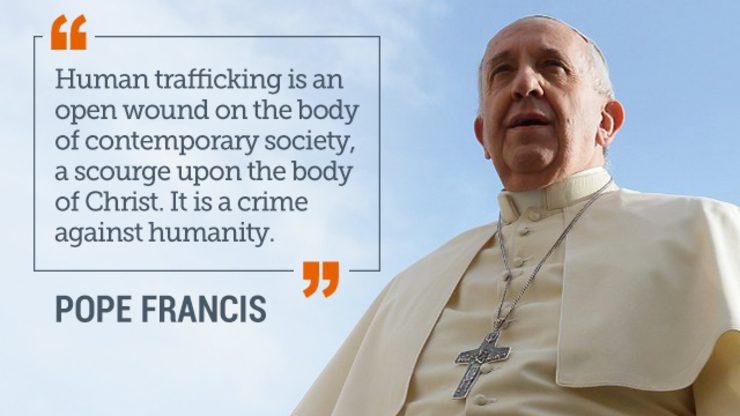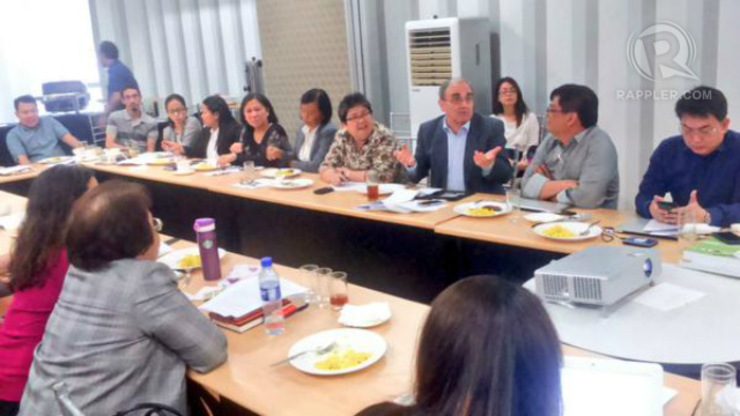SUMMARY
This is AI generated summarization, which may have errors. For context, always refer to the full article.

MANILA, Philippines – With the arrival of Pope Francis in the Catholic-majority Philippines came pleas from groups left and right for the beloved pontiff to speak on the causes they represent.
Open letters and official statements asking the charismatic Pope to stand with them in their respective plights abound – from political prisoners, youth organizations, labor unions, and even a pro-environment, anti-mining priest.
They understand the weight of Francis’ words, that his reach and appeal transcends religious boundaries.
But a small gathering of civil society organizations and leaders in the worker recruitment industry opted the alternative route: to respond to an advocacy (to use the secular term for it) close to Francis’ heart.
Pope Francis makes it clear: “Human trafficking is an open wound on the body of contemporary society, a scourge upon the body of Christ. It is a crime against humanity.”
The goal of the gathering was to transform rhetoric into action by asking: What can we do right now to combat human trafficking in the Philippines?
The groups met two days before the celebrated arrival of the leader of the world’s 1.2 billion Catholics, whose plane landed at a Philippine military base Thursday late afternoon, January 15.
Francis’ appeal was simple: “Businesses have a duty to ensure dignified working conditions and adequate salaries for their employees, but they must also be vigilant that forms of subjugation or human trafficking do not find their way into the distribution chain.”
‘If they are legitimate businessmen, they should be more conscious of the effect of their transaction on our workers.’
– Susan ‘Toots’ Ople, pro-OFW advocate
Business groups represented during the event include the Philippine Association of Service Exporters Inc, the Australia and New Zealand Association of Employment Providers of the Philippines, and the Philippine Recruitment Agencies Accredited to Saudi Arabia.
An actionable gap
To formulate an anti-human trafficking action plan, the groups at the dialogue determined pressing issues hounding the worker recruitment industry today.
Foremost of the actionable gaps pointed out was the control of foreign entities over local recruitment hubs, making Filipino workers more vulnerable to trafficking due to the minimized oversight by Philippine regulatory bodies.
“There was an awakening. Even if they [local employment agencies] don’t want to be part of human trafficking, their agencies may be used as conduits for human trafficking and they don’t even know about it,” explained Susan Ople, an influential advocate among the event organizers.
Foreigners’ use of Filipino agencies to engage in recruitment operations in the country puts workers seeking employment abroad at risk, said Ople.
Ople said this anomaly is possible “because there are some Filipinos who agree to be dummies to put up agencies which are actually controlled by foreign investors.”
She also warned against foreign entities that partially invest in and/or enter underground deals with local recruitment agencies to establish franchises in provinces, calling on agencies to be more conscientious in their partnerships.
“If they are legitimate businessmen, they should be more conscious of the effect of their transaction on our workers,” she said.

Impact on the recruitment sector
Lito Soriano, a former overseas Filipino worker (OFW) who is now president of LBS Recruitment Solutions, said this “very dangerous phenomenon” creates an environment of unethical selection of workers and their target employers.
“No foreigner should be allowed to participate [in] or own recruitment agencies that deploy domestic helpers….They are not afraid of violating the rules because in fact they are not even identified,” he explained.
Soriano added that these non-compliant foreign-controlled agencies loosen the screening process of worker-applicants so they can be deployed faster, and generate greater profits for them. This creates problems during their employment stay abroad.
The government in turn reacts by tightening regulatory mechanisms, unduly affecting legitimate players that follow the rules and provide more protection for workers.
The issue becomes even more alarming, said Soriano, as the impending “ASEAN integration will increase the number of trafficking through illegal recruitment because of the free flow of labor.”
The group proposed to nationalize recruitment of vulnerable OFWs and called for a moratorium on the licensing of new agencies, Soriano said.
“Not infrequently, the victims of human trafficking and slavery are people who look for a way out of a situation of extreme poverty; taken in by false promises of employment, they often end up in the hands of criminal networks which organize human trafficking.”
– Pope Francis
Vulnerabilities
Human trafficking is a serious issue in the Philippines, being a known labor exporter.
Latest government data show that of the 10.49 million Filipinos overseas, 4.22 million are documented migrants whose stay are employment-related and 1.43 million are undocumented.
Even as a recent worldwide assessment ranked the Philippines’ efforts against modern slavery as the best in Asia, another international report noted that “a lack of understanding of trafficking and the anti-trafficking legislation among many judges, prosecutors, social service workers, and law enforcement officials have impeded more successful prosecutions” in the Philippines.
“No prosecutions of police complicit with traffickers have been reported,” the report added.
Still, Soriano said the main driver of labor migration is the lack of opportunities in the countryside.
Love put into action
The People’s Pope, as the Argentina-born Jorge Mario Bergoglio is known, has this to say further about how poverty forces people into compromising positions:
“Not infrequently, the victims of human trafficking and slavery are people who look for a way out of a situation of extreme poverty; taken in by false promises of employment, they often end up in the hands of criminal networks which organize human trafficking.”
At his arrival at the Villamor Airbase on Thursday, January 15, Francis was met by festive dances performed by young people and welcome honors by the government and Catholic Church leaders.
In a country where displays of religious fanaticism is common, the Pope’s arrival raised the bar further with thousands of pilgrims waiting at strategic areas for as long as 12 hours before they caught a glimpse of the man they call Holy Father.
On social media, Filipinos who watched the pomp on live television described the seconds-long passing by of the Pope per corner and area of Manila’s streets as overwhelming, goosebumps- and tear-inducing.
Another devout believer said it felt like “nilukuban ka ng Ispirtu Santo (you were filled with the Holy Spirit)” as the Argentine pontiff whizzed by in his jeepney-styled popemobile.
For pro-OFW advocate Ople, “the best way we can honor the Pope’s visit and honor our country is to still come together and continue our fight even after he leaves.”
“Here comes the Pope reminding everyone that we all have a stake in ensuring the dignity of our workers wherever they are in the world,” she said, aware that true religion is love translated into action. – Rappler.com
Tied Hands image via ShutterStock.
Add a comment
How does this make you feel?
There are no comments yet. Add your comment to start the conversation.